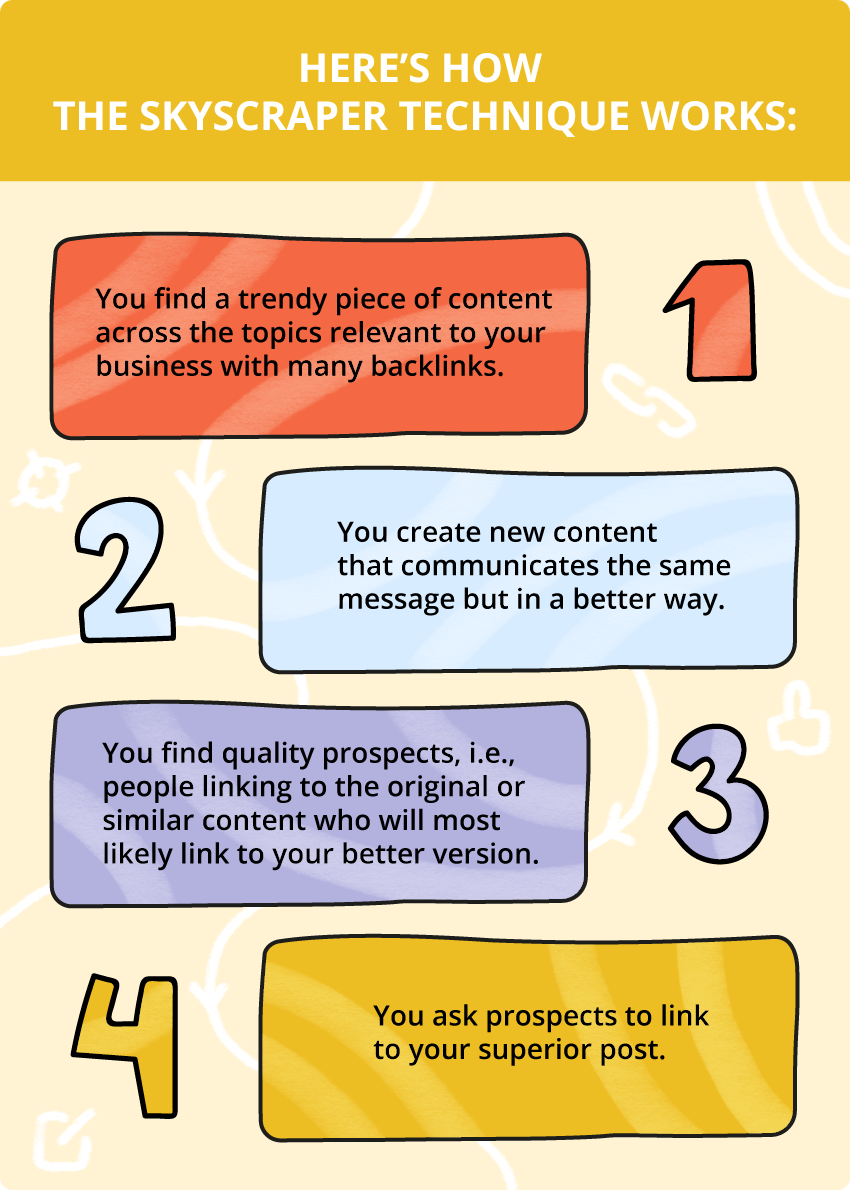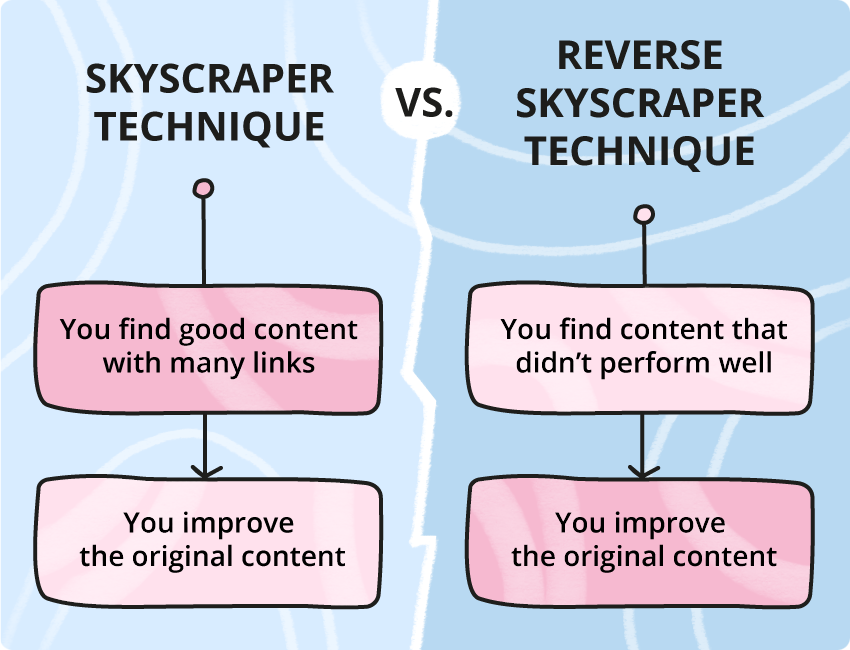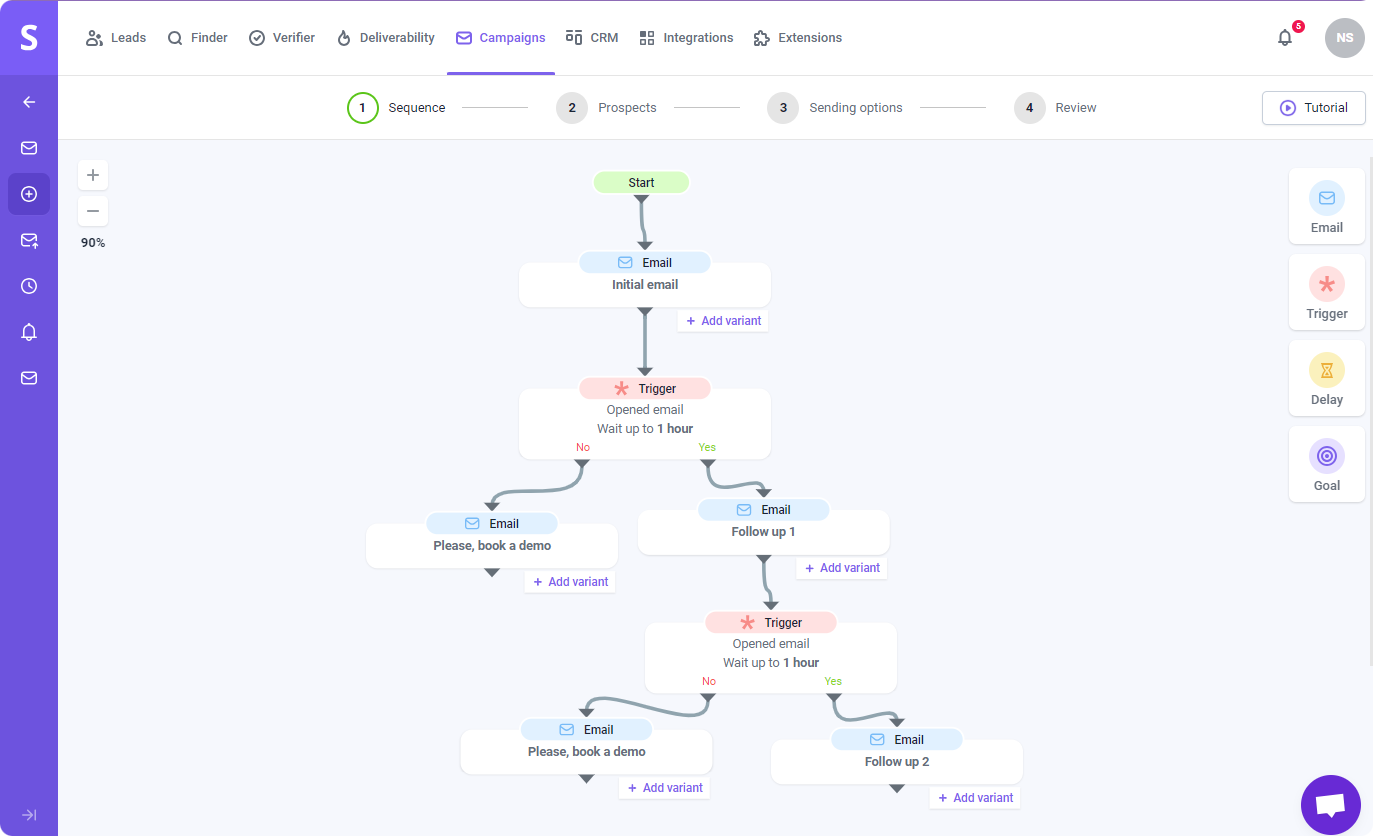No matter how unique and valuable your content is, it won’t go far if you don’t promote it. And when it comes to promotion, content marketers and bloggers realize that attracting a wider audience is possible via link-building.
The truth is, however, that getting links is often time-consuming, to say nothing of getting quality links from reputable sites. Therefore, SEO and marketing experts have always been trying to find strategies that would simplify this process. One of them is the Skyscraper SEO Technique, a link-building tactic we’ll discuss in this post.
Feel free to use this article as a guide to the Skyscraper Technique for blogging or as inspiration for content promotion.
Spoiler: linkbuilding outreach requires a database with reliable contacts. Below, we will explain in detail how you can find high-quality emails and start your outreach.
Outline:
What is Skyscraper Technique and why it rules
The Skyscraper Technique is a link-building strategy that presupposes improving the existing popular content and replicating the backlinks to increase traffic.
This approach was developed in 2015 by Brian Dean, an expert from Backlinko, who was excited to share how it helped him increase organic traffic by 110% in just two weeks.
In recent years, this technique has become one of the components of a link-building campaign for many SEOs and marketers.
Here’s how the Skyscraper Technique works:

The Skyscraper Technique has stormed the SEO and marketing world because of the following reasons:
1. It helps you come up with the right content
By analyzing how well the topic is presented in the original article, you understand what aspects made it successful, which helps you improve your content, creating more engaging posts.
2. You deal with a warmed-up audience
People you are about to reach have already linked to a similar piece of content. So, they are subconsciously prepared for something more exciting than they’ve already read. What you need to do is to turn their attention to the way you are talking about the things that interest them, and how your version beats the original.
3. It helps you drive more traffic
That’s the key factor why the strategy works well. It’s most likely that the existing content that boasts of many backlinks has a high ranking. If you create something deeper and unique (i.e., something better than the original), you have a chance to outrank it and enjoy getting more traffic.
Meanwhile, with this technique in your pocket, you may reach out to many new prospects, which only increases your opportunities to attract people to your website.
Reverse Skyscraper Technique
Sometimes you may wish to go in the opposite direction and start searching for content from a reputable source that didn’t get many links or didn’t rank prominently on Google.
Such a model is the opposite of the common Skyscraper Technique, so it was called the Reverse Skyscraper Technique. You may use it as an option for meeting your link-building goals too.
It works the same way; the only difference is content you are targeting to skyscrape:

A step-by-step guide on how to use the Skyscraper Technique
Here at Snov.io, we’ve been using the Skyscraper SEO Technique for content promotion and traffic growth for a long time. Now it’s your turn to join the game. Let’s talk about how you may proceed with it step by step.
Step 1. Find Skyscraper content
At this stage, you should start searching for relevant content across your topic that has many backlinks. There are many tools to help you with this task. We rely on Ahrefs, but you may also try other services like Semrush, Majestic, and so on.

You may find content in several ways: by keyword, by topic, or by the authoritative source. Here’s how:
By keyword
To search for content by keywords, you can use a keyword explorer search tool. Enter a broad keyword (e.g., prospecting) and get to the SERP (Search Engine Results Page) overview to see the post that ranks higher than all other pages.
Note: It’s recommended to set a KD (Keyword Difficulty) filter at 40, as pages for keywords with high KD often have many backlinks.
By topic
To find content by topic, you should go to a content explorer search tool where you would enter a broad topic of your interest (e.g., sales prospecting) and sort the results by the referring domains. Choose a top-ranking page, skipping homepages and specific product pages.
Note: Set the ‘Referring domains’ filter at 50 to get the list of pages with many backlinks.
But what if I am not sure about the topic yet?
A good question. If you don’t know which topic to cover but have an authority website in mind, you may still find it with the site explorer search tool.
By the authoritative site
To find content by the reputable site, you should go to the site explorer search tool and enter the needed link. Using Best by links report, you’ll get to the list of top-ranking pages. The only thing left will be to type in the topic of interest and find the post.
For instance, your goal is to find the top-ranking piece of content in the Snov.io blog. Just enter snov.io/blog and sort the list of URLs by Referring domains to see the relevant post. Let’s see how it looks in Ahrefs:

Will you take on a challenge to skyscrape it? 🙂
Step 2: Make the original content much better
Okay, you’ve found the content to top. Now it’s high time for you to beat the original. Here are some tips for you to win the game:
Make it longer
If there is anything you can add to the existing post, don’t miss a chance. Add more information, list more items if possible, in short, extend the existing piece so that it could provide more value to the audience.
For instance, if the original post sounds like “5 tips to speed up your sales cycle,” stand out with a list of more, just like we did in our post. But make sure your additions are not far-fetched. The information must be logical and relevant.
Make it more detailed
Think of how you can present facts in more detail and make the post juicy. You’ll need to present more thorough research to ensure people you are knowledgeable and very generous to share this knowledge in your post.
For instance, you may:
- Provide descriptions to only-listed items
- Add statistical data
- Explain difficult terms
- Add examples or use cases, and so on
Make it more actual
The world develops with rocket speed. No doubt, your industry, too. There’s always something new you may add to the original post, even if it has been written 2 months ago.
By showing the old stuff in the up-to-date light, you’ll give it another life. People love this fresh air of updates, trends, and innovations…
Make it brighter
Design is the king in the age of visualization we live in. At the same time, visual content is the biggest challenge for 23.7% of content marketers. Take on the challenge. Believe it or not but adding some infographics or modern images to the original post, you can generate more links than the content with poor or no visuals.
Step 3: Find quality prospects
The main idea behind the Skyscraper Technique is to find people who have already been engaged with similar content. This means that your quality prospects are those who:
- Are inhabiting your niche
- Are interested in your topic
- Have already linked to one similar post(s)
The process presupposes finding prospective placements, organizing the data filtered and listed in the spreadsheet, and finding prospect’s contact information.
Now let’s look at one of the examples how this process may look:
- You find backlinks to the original piece, other top-ranking pages, or outdated content using the above-mentioned SEO tools such as Ahrefs, Semrush, Majestic, or others.
- You export the list of backlinks as the CSV file.
- You analyze it carefully to omit any article directories or forum links (you need quality links only, right?).
- You use the email lookup tool to find email addresses of your prospects.

How to find prospect email addresses with Snov.io?
There are crazymany email finders that will help you enrich your email list in less than a minute. The only problem may be their price as not all of these platforms offer cheap functionality.
Snov.io Email Finder definitely has a competitive advantage since it has some of the mildest pricing plans and an incredible opportunity to try some of the features for free.
Having a list of domains you’d like to reach out to, use Snov.io Bulk Domain Search to get respective emails from these domains:

You can also scrape emails from any webpage using Snov.io Email Finder extension for Google. Just download it, go to any website, click the extension icon, and get impressed with the list of generated emails:

Step 4: Start your email outreach
As soon as you have a list of prospects, it’s high time you prepare your email campaign. Here’s a brief email outreach algorithm:
- You segment your prospect list.
- You choose an email outreach tool.
- You create and send a highly personalized email campaign.
Segment your prospect list
You can’t send the same message to all prospects as not all of them linked to the original content because of the same reason.
SEO tools may help you segment your audience according to the anchored text. In particular, when you find the perfect original post to skyscrape, you may check what prospects linked to this post using X anchor text, and those who linked to it using Y anchor text:

This will help you segment your prospect list correspondingly and come up with relevant email messages.
Choose an email outreach tool
As with email lookup software, you may find many platforms for creating and sending email messages. Snov.io cold email software has been launched as a marketing and sales automation tool that allows you to create an email sequence in a drag-and-drop campaign editor, launch a complex email campaign, and enjoy its real-time statistics.

Create highly personalized outreach emails
If you want to get linked using the Skyscraper Technique, don’t stick to some template that you may easily find somewhere on the web.
Make your email personal, and that’s not only about inserting the prospect’s name. That includes:
- Avoiding generic subject lines
- Demonstrating that you know something about the prospect (you know, a sort of home-work done)
- Asking for links in a non-pitchy way
For example, instead of presenting your article as something phenomenal, first ask your prospect’s opinion about it, mentioning in what way you updated the information stated in the original content your prospect has linked to.
There are many ways to personalize your emails, indeed. Feel free to find working ones in one of our posts.
Successful use cases
Now that we’ve discussed how to use the Skyscraper Technique step by step, let’s see the best use cases demonstrating how successful this strategy may be when achieving SEO and marketing goals.
1. AuthorityHacker got 4,306 backlinks in the course of 3 years
For AuthorityHacker, one of the leading marketing education companies, the Skyscraper Technique is apparently the most beloved strategy of cold outreach. And it’s not surprising since they get 92% of their links applying the Shotgun Skyscraper method.
This volume approach is based on sending many automated semi-personalized emails with the aim of getting as many links as possible.

Here’s a quick rundown of their successful outreach campaign with the Skyscraper Technique:
Number of prospects found: 152,000
Number of emails sent: 630,000
Number of email campaigns: 78
Campaign duration: 3 years
Tools used:

Link-searching tool: Ahrefs (the company is choosing keywords with high KD score)
Email-finding tool: Hunter (as an option, they recommend using Snov.io too).
Email outreach tool: Mailshake
Result: 4,306 backlinks from 4,244 referring domains

What’s really motivating is that AuthorityHacker guys never stop. Testing the Skyscraper Technique on a brand new website, they have seen a drop-dead traffic growth:

2. Backlinko increased organic traffic by 652% in 7 days
Brian Dean, the Backlinko SEO blog runner and the person who deserves the acclaim for suggesting the Skyscraper Technique, continues to astound the business public with compelling results achieved with this strategy.
The moment of truth was when Brian Dean realized the Skyscraper Technique wouldn’t work unless he identified and satisfied user intent, i.e., the main goal behind a user’s Google search. He called this version Skyscraper Technique 2.0.
As soon as he could understand the user intent and came up with targeted content, he went on by optimizing it for UX Signals. In other words, he made it user-friendlier by:
- Adding videos and a table of contents
- Reducing introductions to several sentences
- Providing lots of examples
- Structuring the text with the help of subheadings
- Using short paragraphs and sentences
Combining the Skyscraper Technique 2.0 with the one he had been using since 2015, Brian Dean managed to increase organic traffic to one of Backlinko’s blog posts by a tremendous 652% in just… one week!

And here’s the main takeaway from Brian’s user case: the powerful combination of Skyscraper Technique 1.0 and 2.0:

3. Ryan Robinson drove 70k+ just from one post
Ryan Robinson, a renowned blogger, decided to use the Skyscraper Technique in marketing to outdo the post from Fast Company about a freelance hourly rate calculator. He added a quality infographic and created an eBook about the necessary steps to launch a freelance career.
Using BuzzSumo, Robinson found other brands and blogs publishing and sharing content related to ‘freelance hourly rates.’ He reached out to them asking if they would be interested in republishing the updated information stated in the infographic.

As a result, Ryan’s post was shared over 8,200 times and could outrank the Fast Company article for the key search word expression of ‘freelance hourly rate.’
It got 72,000+ page views and 3,648 new email subscribers, to say nothing of lots of valuable backlinks and re-published versions of the infographic, which goes on being used in the context of freelance work around the web.
Wrapping up
With high hopes my post has unveiled the specifics of the Skyscraper SEO Technique, I wind it up optimistically. Having about six years of history behind, this technique doesn’t seem to go stale. Use cases considered above prove the contrary: the Skyscraper Technique is alive and gets updated in its new versions.
It’s high time you rushed trying this strategy too. Just remember to perform it step by step, be consistent, and use Snov.io for your prospecting and outreach goals. Skyscrape it!





